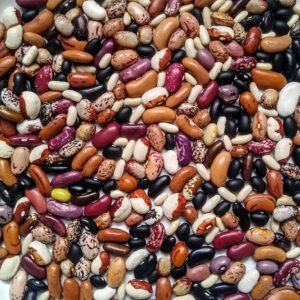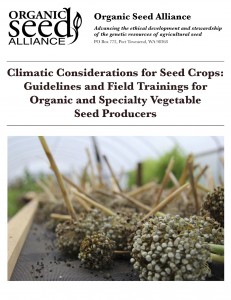
 Organic Seed Alliance (OSA) is pleased to announce the release of Climatic Considerations for Seed Crops: Guidelines and Field Trainings for Organic and Specialty Vegetable Seed Producers. The guide focuses on organic and specialty seed production in the Northwest, and was funded by the U.S. Department of Agriculture’s Risk Management Agency. The guide is also available in Spanish.
Organic Seed Alliance (OSA) is pleased to announce the release of Climatic Considerations for Seed Crops: Guidelines and Field Trainings for Organic and Specialty Vegetable Seed Producers. The guide focuses on organic and specialty seed production in the Northwest, and was funded by the U.S. Department of Agriculture’s Risk Management Agency. The guide is also available in Spanish.
The new publication provides growers an understanding of climatic challenges in their region and how to mitigate these challenges through risk management strategies. It also instructs growers on which crops are best suited to their local climate.
The Northwest region contains some of the best seed producing areas in the world. In 2009, there were 27,000 acres in vegetable seed production in Idaho, Washington, and Oregon combined, representing about 80% of the total vegetable seed acreage in the U.S. and valued at more than $50 million. The rapidly growing organic seed market presents an excellent opportunity for organic farmers to diversify into seed production.
Seed production requires specialized skills and knowledge to produce quality seed of specific crops. Understanding local environmental conditions and their impact on the feasibility of quality seed production is critical to a seed producer’s success. In any given climatic region there are certain crops and varieties that are best suited to the environmental conditions.
The guide provides detailed climatic considerations, including environmental influences on pollination and fertilization, and the influence of temperature, day length, frost-free days, precipitation, and wind on seed production. The guide also includes sections on environmental management, crop selection for seed production, and the history and geography of seed production in the Northwest.
Earlier this year, OSA delivered five trainings in Oregon, Washington, and Idaho as part of this project.
Download the guide for free at www.seedalliance.org.
Organic Seed Alliance advances the ethical development and stewardship of the genetic resources of agricultural seed. Learn more at www.seedalliance.org.
This institution is an equal opportunity provider.
